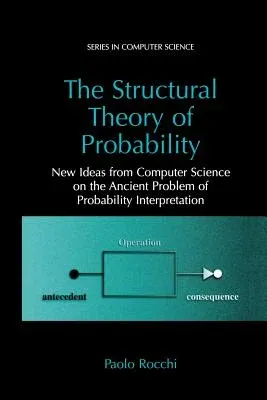The Structural Theory of Probability addresses the interpretation of
probability, often debated in the scientific community. This problem has
been examined for centuries; perhaps no other mathematical calculation
suffuses mankind's efforts at survival as amply as probability. In the
dawn of the 20th century David Hilbert included the foundations of the
probability calculus within the most vital mathematical problems; Dr.
Rocchi's topical and ever-timely volume proposes a novel, exhaustive
solution to this vibrant issue.
Paolo Rocchi, a versatile IBM scientist, outlines a new philosophical
and mathematical approach inspired by well-tested software techniques.
Through the prism of computer technology he provides an innovative view
on the theory of probability. Dr. Rocchi discusses in detail the
mathematical tools used to clarify the meaning of probability,
integrating with care numerous examples and case studies. The
comprehensiveness and originality of its mathematical development make
this volume an inspiring read for researchers and students alike.
From a review by the Mathematical Association of America Online: "[The
author's] basis thesis is this: Probability theory from Pascal to
Kolmogorov and onwards has focused on events as sets of outcomes or
results, and probability as a measure attached to these sets. But this
ignores the structure of the processes which lead to the outcomes, and
the author explores how taking into account the details of the processes
would lead to a more fundamental understanding of the nature of
probability. This is an interesting idea, and the author makes it clear
that at present this is a work in process and not yet a finished
product, for he says that he has tried to give "an impulse in the right
direction" with his theory. ... One hopes that in due course the author
will develop his theories further and present overwhelmingly persuasive
examples of the advantages of his approach." - Ramachandran Bharath


